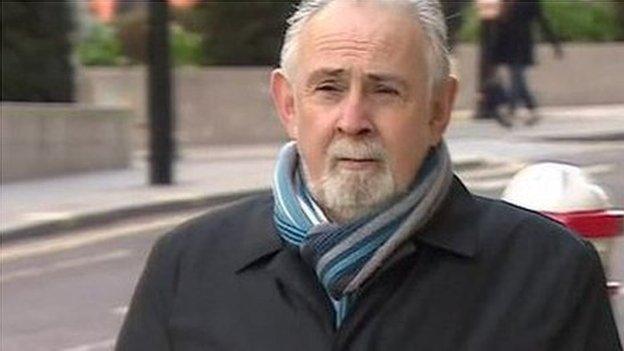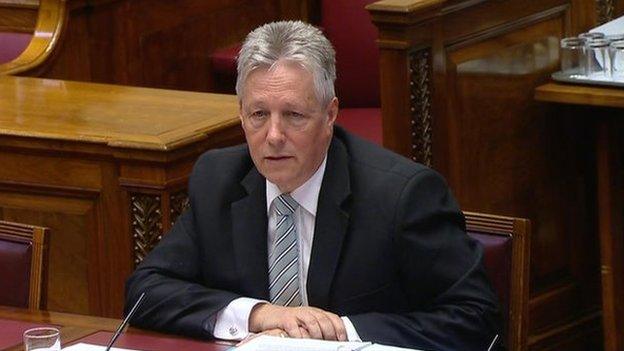On the Run letters: Barra McGrory says letters are 'virtually worthless'
- Published
Barra McGrory QC answered questions about the On the Runs scheme from the Northern Ireland Affairs Committee
Northern Ireland's chief prosecutor has said letters sent to so-called On the Runs saying they were not wanted by police are "virtually worthless".
Director of Public Prosecutions Barra McGrory QC told a parliamentary inquiry the letters were "not an impediment to prosecution" if new evidence emerges.
He added he did not believe any leading member of Sinn Féin had got a letter.
The inquiry is examining how more than 200 people were told they were not wanted for paramilitary crimes.
The On the Runs letters scheme came to light in February when the trial of County Donegal man John Downey for the 1982 IRA Hyde Park bombing collapsed.
The prosecution was halted because Mr Downey had mistakenly received a letter telling him he was not wanted by police.
'Extraordinary'
Mr McGrory was among a number of high-profile witnesses called to give evidence to the Northern Ireland Affairs Committee inquiry into the scheme, which is holding two days of hearings at Stormont.
The DPP told the committee that he had "no knowledge of Mr Downey's existence" until a few days before the judgement in the halted trial was made public.
He said that that the letters were not an amnesty and those who had received them "ought not to be sleeping easy in their beds".
He added that recent advances in DNA analysis was one example of how new evidence could emerge in some cases and lead to prosecution, despite the suspect having received a letter.
Mr McGrory said Mr Downey's case was different because he had been sent a letter in error.
He explained that the scheme was an "extraordinary" measure that had come about in 1999 as a result of high level political negotiations involving the government and Sinn Féin.
'Flawed'
The DPP added that some of the letters were sent to people who, ordinarily, detectives would have liked to question about crimes, but the suspects were told they were not wanted by police because the decisions were made on an "evidential" rather than an "intelligence" basis.
"From a prosecutorial point of view, speaking as a prosecutor, the scheme is flawed in the sense that it submitted names to the prosecution service in respect of whom there was potentially evidence, on the basis that the police had no interest in those individuals when in fact in other circumstances they would have," Mr McGrory said.

The collapse of John Downey's trial earlier this year sparked the On the Runs crisis
He added: "The police service took a decision to engage with this process, also at the request of government, and it was the police service which provided the information to the director of public prosecutions that certain individuals were no longer of interest to them, when perhaps they were.
"But the scheme was based on evidence, rather than intelligence, so the indications that were given to the department of the director of public prosecutions were based on available evidence - a very different thing of course from intelligence or information which the police might have had which would have connected individuals to crimes."
Mr McGrory also confirmed that to date, there has not been a successful prosecution of any suspect in receipt of an On the Runs letter.
He was asked to provide a copy of the full list of names of the recipients to the committee and replied that he had "no objection in principle" but would need time to consider the legal implications.
'Politically important'
In his previous role as a private solicitor, Mr McGrory acted on behalf of Sinn Féin on occasions and also met a senior police officer in charge of a specialist PSNI team set up to deal with the On the Runs issue.
He confirmed to the committee that while he was representing the party, he had passed a list of names of individuals to the UK authorities to be considered for the On the Runs scheme.
However, Mr McGrory said he personally had "no hand, act or part" in designing the scheme which he said had been devised by politicians in government, in negotiations with the Sinn Féin leadership.
He said that while he did provide some "advice" regarding the On the Runs scheme, he played a "minimal role" and had been acting as a "facilitating solicitor" on behalf of his client.
'Poacher turned gamekeeper'
Mr McGrory added that although the On the Run letters were of limited legal value, at the time they were introduced they were "politically important obviously, to the prime minister and the leadership of Sinn Féin to move the (peace) process to the next stage".
"Obviously, since the police at the time had engaged in the process of giving the letters, there was a certain amount of confidence in certain quarters that they were no longer being pursued. I think that confidence would now have abated," the DPP added.
During the committee proceedings, he was described by the North Antrim MP Ian Paisley as a "poacher turned gamekeeper".
Mr McGrory said it was not a term he recognised but "would take it as a compliment".
He said that during his former career as a solicitor he had not only acted for Sinn Féin but also for former police officers and soldiers and people with no connection to the Troubles.

Peter Robinson told the committee the government had "deliberately deceived" other political parties over the secret scheme
Attorney General John Larkin QC, who advises members of the executive and protects the public interest in matters of law, discussed whether suspects could be tipped off if they applied for a letter and failed to get one.
He told the committee a refusal could amount to being told to "stay where you are" to avoid arrest and added this seemed to give rise to the offence of tipping off or attempting to pervert the course of justice.
"It strikes me that the aspect of the scheme which has been relatively under-explored has been the indication, by whatever means, to individuals that the police are still looking for them," Mr Larkin said.
'False assurances'
Northern Ireland's First Minister Peter Robinson was the next witness to be called before the inquiry after Mr McGrory and told the committee the On the Runs letters had come "like a bolt out of the blue".
Mr Robinson said the government had "deliberately deceived" the other political parties in Northern Ireland by introducing the secret scheme.
"The scheme was hatched in the full knowledge that victims could be denied the possibility of justice. It was inequitable, sectarian - a concession to republicans alone.
"It was deceitful and carried out behind the backs of two sets of unionist negotiators and involved consciously supplying false assurances and disingenuous answers to direct queries," the first minister said.
Mr Robinson added that the letters must have "no legal authority" and must be declared "null and void".
There are currently three inquiries into the On the Runs controversy.
One is a judge-led inquiry, ordered by Prime Minister David Cameron and overseen by Lady Justice Hallett.
The Northern Ireland Affairs Committee is holding its own parliamentary inquiry into how the scheme operated and the Northern Ireland's Assembly's Justice Committee is also holding its own hearings.